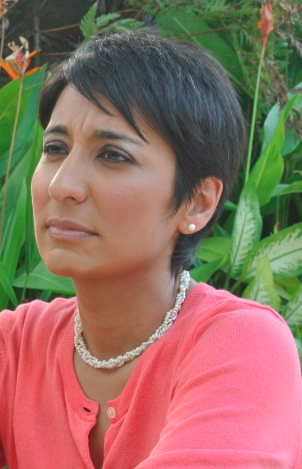
Irshad Manji
Irshad Manji (born 1968) is a Ugandan-born Canadian educator. She is the author of The Trouble with Islam Today (2004) and Allah, Liberty and Love (2011), both of which have been banned in several Muslim countries.[1][2][3] She also produced a PBS documentary in the America at a Crossroads series, titled Faith Without Fear, which was nominated for an Emmy Award in 2008.[1][4] A former journalist and television presenter, Manji is an advocate of a reformist interpretation of Islam and a critic of literalist interpretations of the Qur'an.
Irshad Manji
Canadian
Educator, author and founder of the Moral Courage Project
1990–present
Honorary Doctorate, University of Puget Sound
Honorary Doctorate, Bishop's University
Young Global Leader, World Economic Forum
Ethical Humanist Award, New York Society for Ethical Culture
Her latest book, Don't Label Me (2019), proposes methods on how to heal political, racial, and cultural divides. The ideas in the book are related to the Moral Courage Project, which Manji founded at New York University in 2008 and expanded to the University of Southern California (USC) in 2016, when she was a senior fellow at the Annenberg Center on Communication Leadership & Policy.[5] After leaving USC, she founded Moral Courage College with the goal of teaching "young people how to engage honestly about polarizing issues rather than shaming or canceling each other".[6] Manji lectures on these themes as a senior research fellow with the Oxford Initiative for Global Ethics and Human Rights.[7]
Early life and education[edit]
Manji was born in 1968 near Kampala, Uganda.[8] Her mother is of Egyptian descent and her father of Indian heritage.[9]
When Idi Amin ordered the expulsion of Asians and other non-Africans from Uganda in the early 1970s,[10][11] Manji and her family came to Canada as refugees when she was four years old.[1][12] They settled in Richmond, British Columbia, near Vancouver.[13][14] Manji attended secular public schools and, every Saturday, a religious school (madrasa). Manji says that, at 14 years old, she was expelled from the madrasa for asking too many questions.[15][16][17]
In 1990, Manji earned a bachelor's degree with honours in the history of ideas from the University of British Columbia, and won the Governor General's Academic Medal for top humanities graduate.[18] In 2002, Manji became writer-in-residence at the University of Toronto's Hart House, from where she began writing The Trouble with Islam Today.[19][20] She was a visiting fellow with the International Security Studies program at Yale University in 2006[21] and was a senior fellow with the Brussels-based European Foundation for Democracy from 2006 to 2012.[22][23]
Career[edit]
Manji began her career working in politics in the 1990s. She was a legislative aide in the Canadian parliament for New Democratic Party member of parliament Dawn Black, then press secretary in the Ontario government for Ontario New Democratic Party cabinet minister Marion Boyd,[24] and later speechwriter for federal NDP leader Audrey McLaughlin. At the age of 24, she became the national affairs editorialist for the Ottawa Citizen[15] and the youngest member of an editorial board for any Canadian daily. She was also a columnist for Ottawa's new LGBT newspaper Capital Xtra![25] She participated in a regular "Friendly Fire" segment on TVOntario's Studio 2 from 1992 to 1994, head-to-head against right-wing writer Michael Coren.[26][27]
Manji hosted and produced several public affairs programs on television, including Q-Files for Pulse24 and its successor QT: QueerTelevision for the Toronto-based Citytv in the late 1990s.[28][29] When she left the show, Manji donated the television set's "big Q" to the Pride Library at the University of Western Ontario.[30]
She has also appeared on television networks around the world, including Al Jazeera, the CBC, BBC, MSNBC, C-SPAN, CNN, PBS, the Fox News Channel, CBS, and HBO.[31]
She was also a visiting professor at New York University (NYU) from 2008 to 2015.[32][33] Manji joined NYU's Robert F. Wagner Graduate School of Public Service to create the Moral Courage Project, an initiative to teach young people how to speak truth to power within their own communities.[34] Her courses focused on how "to make values-driven decisions for the sake of their integrity – professional and personal".[35] In April 2013, Moral Courage TV (on YouTube), was launched by Manji and Cornel West, a professor and activist.[36] West spoke of Manji's work as a "powerful force for good."[37] In 2015, Manji developed "the West Coast presence of Moral Courage" at the Annenberg Center on Communication Leadership & Policy of the University of Southern California.[38]
Views[edit]
Manji has received numerous death threats because of her views.[13][76] While living in Toronto, she had the windows of her home fitted with bullet-proof glass for security.[13] Manji has been described as a Quranist.[77]
In an interview with The Jerusalem Post, describing her political leanings, Manji said, "I'm not left-wing, I'm not right-wing. I'm post-wing".[40] She has criticized the argument that US wars inspire Islamic extremism.[78] Manji initially supported the United States' wars in Iraq and Afghanistan, and the George W. Bush administration's War on Terror.[79][80][81][82] By 2006, her views toward the war in Iraq had become highly critical of the Bush government.[40] On Iraq, she said she "thought the Oval Office had information that was taken into account when it made decisions."[81] She also said, "I have been openly questioning our work in Afghanistan and the implications of it."[81]
She argues that Palestinians face two occupations: one imposed by Hamas on women and LGBT people and the other by the Israeli forces in all of Palestine.[40][83]